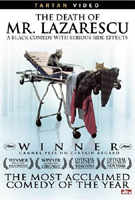 BUY IT AT AMAZON: CLICK HERE!
BUY IT AT AMAZON: CLICK HERE!
STUDIO: Tartan
MSRP: $22.95
RATED: R
RUNNING TIME: 153 Minutes
SPECIAL FEATURES:
• Interview w/ Director
• Featurette on US Healthcare
• Booklet w/ criticism and interview
The
Pitch
"It’s the hero’s journey as conducted by a
man with a subdural hematoma!"
The
Humans
Ion Fiscuteanu, Luminita Gheorghiu.
The
Nutshell
62 year-old Lazarescu Dante Remus (Fiscuteanu) has
been having headaches. They’ve been going on long enough to worry him, so he
calls an ambulance. For the rest of the night, he, along with his faithful paramedic
Mioara (Gheorghiu) visit just about every hospital in Bucharest
search of diagnosis and treatment. But when a high-profile traffic accident
floods the ERs with trauama patients, who has time for an elderly man with
alcohol on his breath and a slipping faculty for reason?
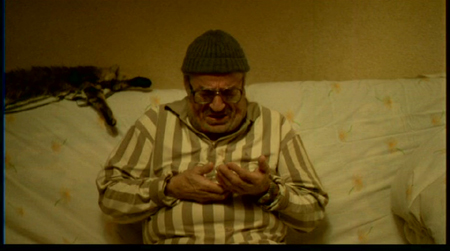
"I could have sworn I saw a dagger before me."
The
Lowdown
This is one of those films that you can’t help but
score highly, but find it difficult to get excited about. I’ve heard a number
of people in conversation say that they can’t ever watch Requiem for a Dream
again, or Breaking the Waves — in some ways The Death of Mr. Lazarescu
will probably occupy a similar region of the mind for me. There are no
amputations, no brutal sequences of ECT, no god-sent descents into
prostitution; instead, there is a melancholy realism that gives an undeniable
sense of sympathy and, at the same time, power. It’s not hard to get a little
bit neurotic and take pity on Mr. Lazarescu by never spinning the disc again,
just he won’t have to live through the plot anymore.
As you might have guessed, one of the film’s great
successes is in the creation and sustaining of individual characters. The focus
is on Lazarescu and Mioara, so they become the deepest, but even the tiniest
bit parts are written and performed with such a natural life that it is
difficult to imagine the thing being a work of fiction. Only rarely do I
experience an absolute suspension of disbelief, but this is one of those times.
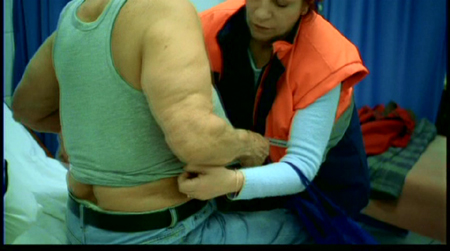
Plumber’s crack extends an average of two centimeters per year
employed as a plumber.
The plot unspools as linear as can be, but it
isn’t stitched together with the typical dramatic trappings of scene, beat, or act.
Individual moments resonate with an authentic drama, which is enough to keep
the momentum going. The writers also play brilliantly with the suggestion of
the film’s title, gradually escalating Lazarescu’s diagnoses and maintaining a
suspense uncommon in this type of movie. I attribute a lot of the reason that
suspense works to the masterful acting and the strict avoidance of cliché. Just
when you find yourself slipping from your belief in the reality of the fiction —
for example when a familiar clash of authorities reminds you that there was the
hand of a director behind the story — a line, or a character moment appears to
throw the gears out of lock, and the artifice crumbles.
So, here’s the funny bit: The Death of Mr. Lazarescu
is billed as a comedy, and it has every right to be considered as such, though
not in the popular sense. This is a comedy because of its timing. A simplified
definition of the literary terms of comedy and tragedy might read,
"Tragedy is what happens when the timing is all wrong; comedy is what
happens when the timing is perfect." Take a look at the three stories in Lola
Rennt for a prime example of each, and a combination of the two.
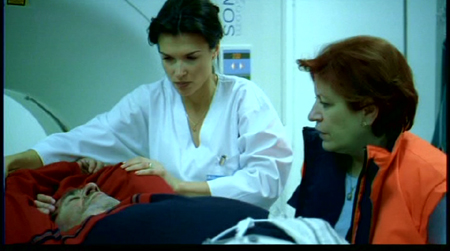
"If I pump his arms and you press on his gut,
I bet we can make him play the Anvil Chorus."
Everything in Lazarescu is timed perfectly, though
in service of guiding the sick man to where he is supposed to be, rather than
to where he wants to be, or where Mioara wants him to be. If you look back over
the plot after having finished it, you’ll see an unbroken thread from point A
to point N that had so many opportunities to be interfered with. Where
Lazarescu ends his journey is a quiet, exquisite moment of perfection, in both
the cinematic and the literary senses. That conclusion, like the rest of the
film, is unassuming in its execution, but demanding of the attention of the
audience.
I’m a reviewer who deals mostly in the abstract
when it comes to these things, and I apologize if that creates a distance
between you and the material, but I’ve got to stay in this abstract land a
little longer. Returning to the film through the process of this criticism
brings back a sense of regret and melancholy that is unanchored and still
potent. It’s a fascinating thing. The Death of Mr. Lazarescu is a
magical piece of cinema, practically able to create emotions out of nothing. No
hyperbole. This is easily one of the best movies I’ve seen this year. I’m
pretty sure I’ll never watch it again.
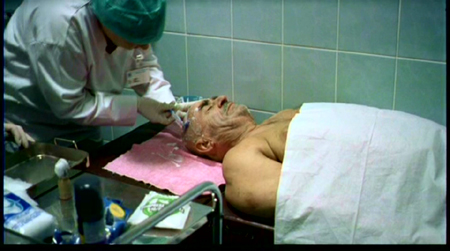
"You’ll be fast as a porpoise now, Mr. Lazarescu."
The
Package
The picture quality is intentionally poor,
hand-held camera work, which makes the audio (in Tartan’s thankfully
ever-present DTS 5.1) particularly impressive. It seems that some bit of unholy
alchemy went into the mix, because the sonics make such a perfect,
location-specific texture that it almost puts you physically into each set.
By way of bonuses, there is a warm, informative
interview with writer/director Cristi Puiu, and a brief featurette on the topic
of the American Healthcare System by a Dr. Fred Berlin. The latter is quite
interesting, and probably features more significant information than you’re
liable to find in Sicko, whenever that gets released. Also listed on the DVD case
is a booklet including Alan Riding’s article in the New York Times on The
Death of Mr. Lazarescu, and a printed interview with director conducted
by Cinemascope’s Christoph Huber. I can’t speak for the quality of these
pieces, but, hell, I doubt they’re just fluff.
8.9
out of 10